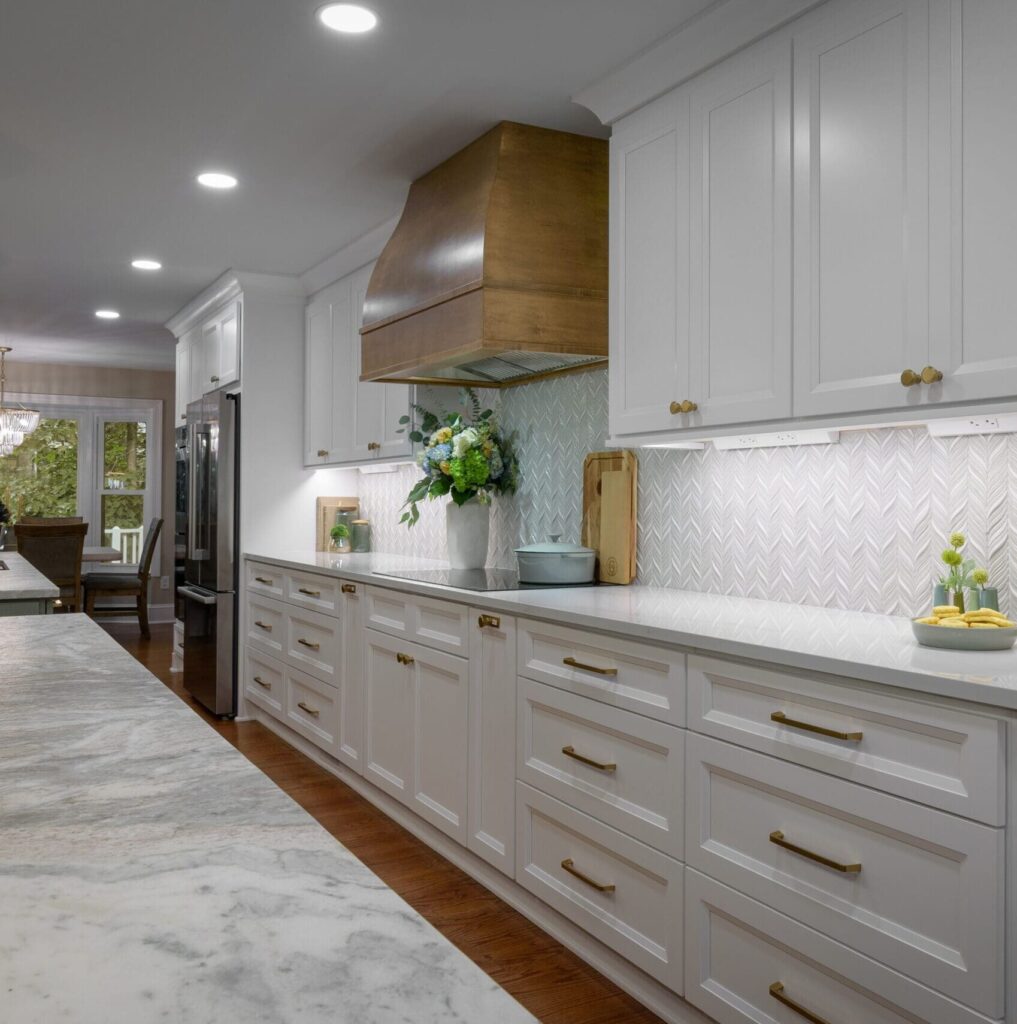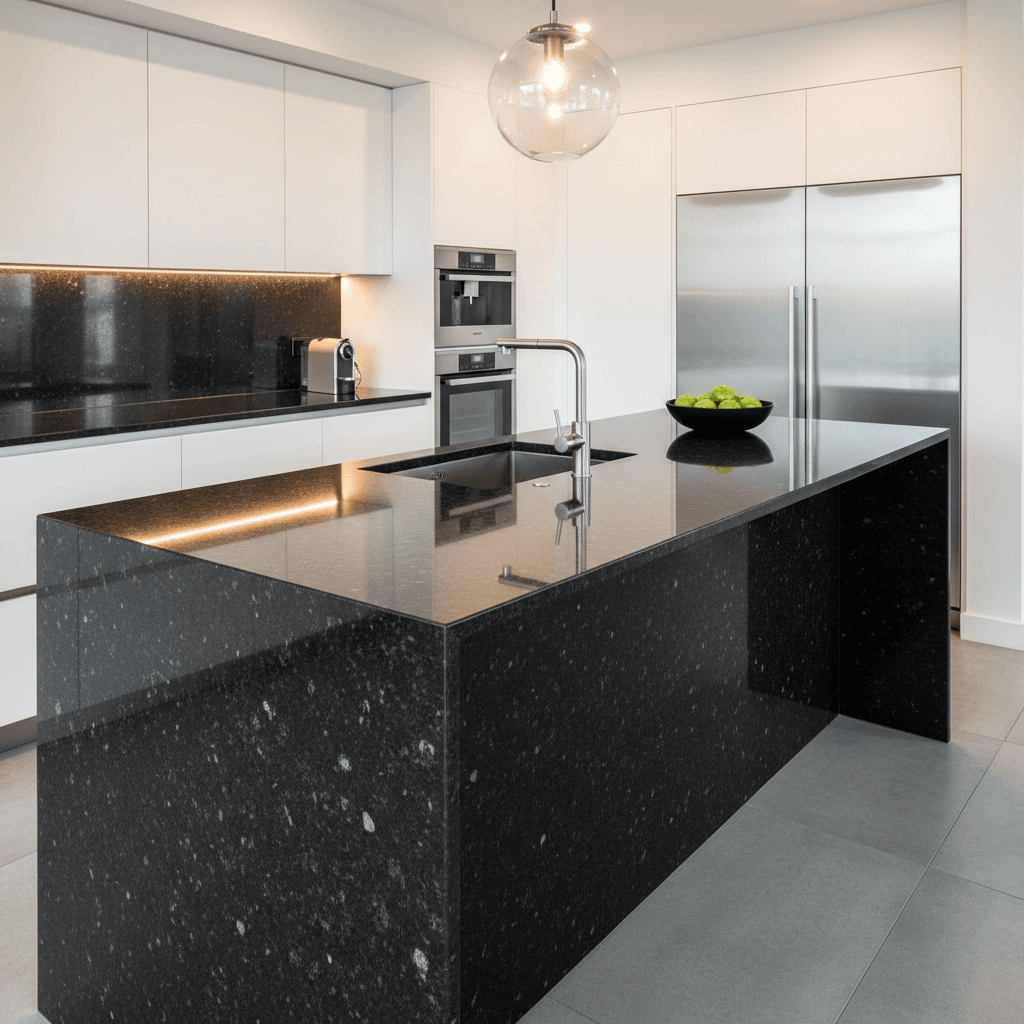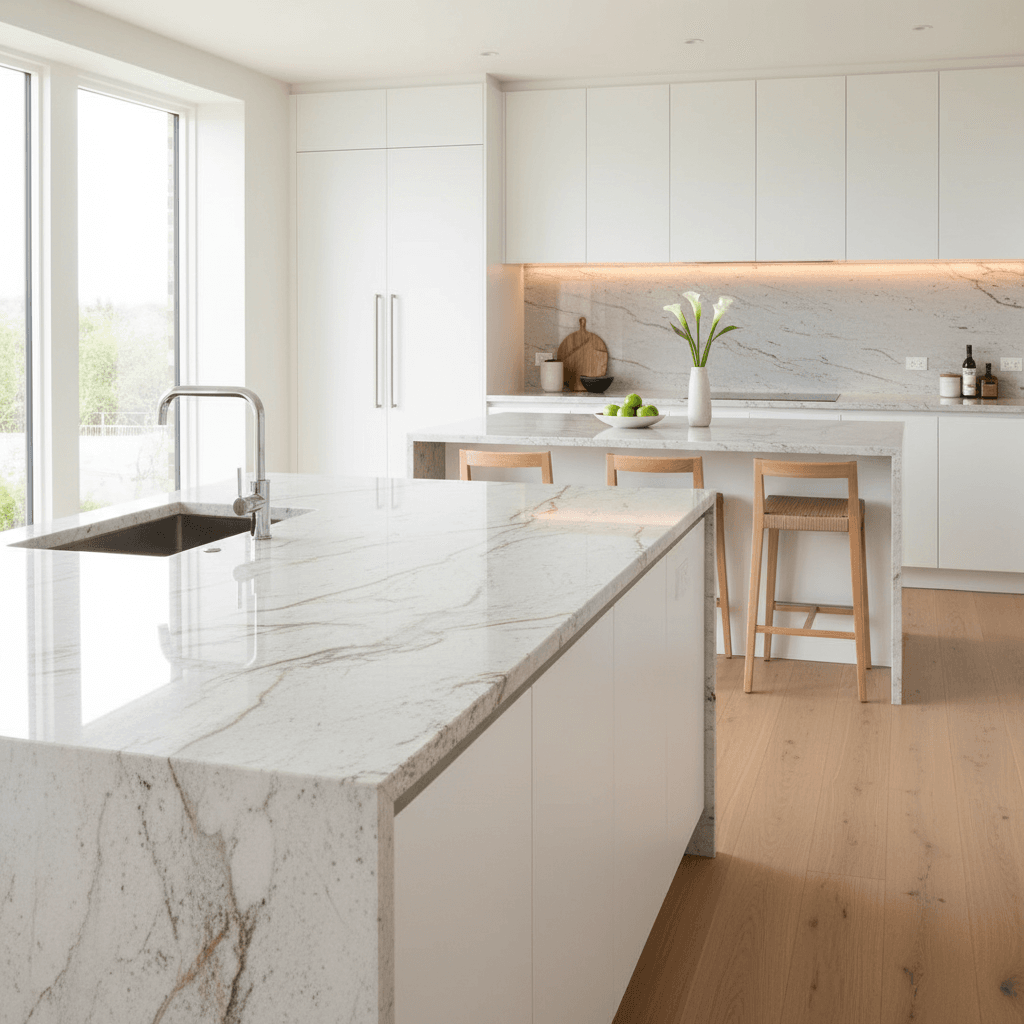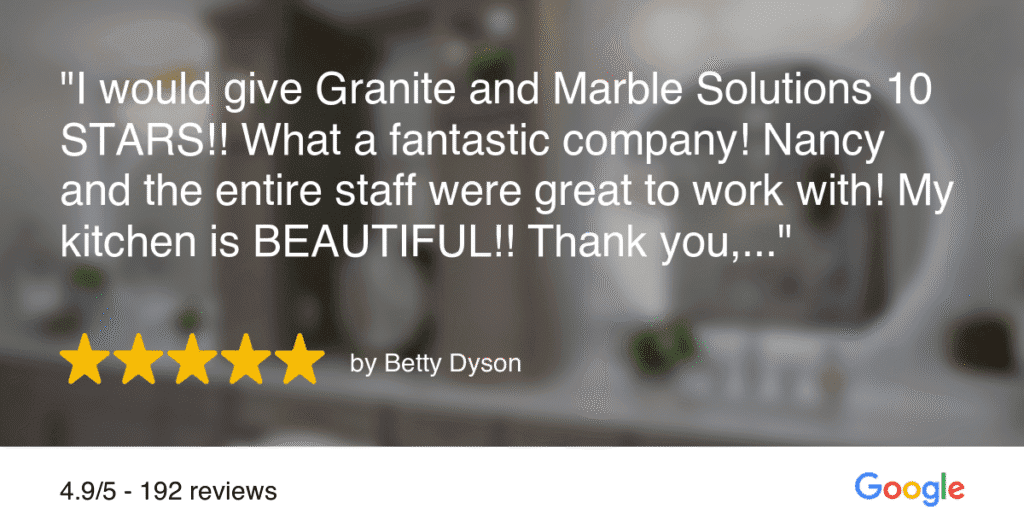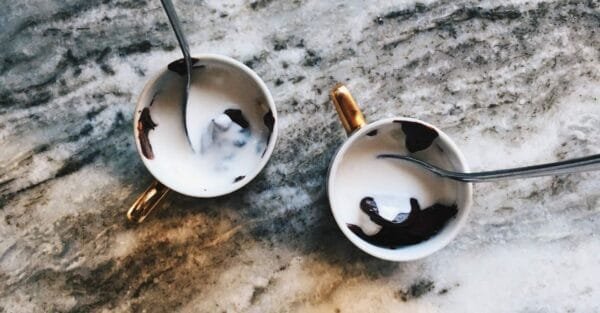
Updated July 2024
If you’re thinking of renovating your home, adding an outdoor kitchen is a great way to go. Not only will it increase the value of your home, but it will make cooking and dining outdoors much more enjoyable. But with so many material options out there, making a decision can feel overwhelming.
No worries, we’ve got you covered. This post is your one-stop shop for everything you need to know about outdoor kitchen countertops. We’ll explore the pros and cons of each material, taking your budget, style, and how you use your space into account. Get ready to transform your outdoor cooking dreams into reality!
Find out how we can help you to create your dream custom outdoor countertop.
Key Considerations for Outdoor Kitchen Countertops
When it comes to choosing the best material for your outdoor kitchen countertop, it all depends on your personal preferences and needs. It must be compatible with your lifestyle and be able to withstand the elements. Here are some factors you should keep in mind.
Firstly, your outdoor countertop will face the full brunt of nature — scorching sunshine, relentless rain showers, and even snow flurries, depending on your location. Here’s what to consider:
- Heat Resistance: Choose a material that can handle the sizzle and heat generated by grills, pizza ovens, or even just a sunny afternoon. Quartz, granite, and soapstone are all excellent choices. Marble, while beautiful, can be susceptible to heat damage like scorching or cracking.
- UV Resistance: Direct sunlight can wreak havoc on some countertop materials, causing fading or discoloration over time. Quartz and porcelain are UV-resistant and will maintain their vibrancy for years to come. On the other hand, some natural stones, like granite, may require a UV-protective sealant to prevent color changes.
- Freeze-Thaw Resistance: If you live in an area with harsh winters, ensure your countertop can withstand freezing temperatures and the inevitable thawing cycles. Properly sealed granite and some types of tile are all freeze-thaw resistant. Marble, however, can crack when exposed to repeated freezing and thawing.
Next, you should consider maintenance requirements. Let’s be honest, no one wants to spend their weekends scrubbing countertops, and some materials are naturally low-maintenance champions, while others require regular sealing or specific cleaning routines. Consider your lifestyle and how much time you’re willing to dedicate to countertop upkeep. Quartz is a superstar in this category — it’s non-porous, stain-resistant, and requires minimal cleaning with soap and water. Granite is generally low-maintenance once sealed, but regular resealing (every 1-2 years) is crucial to maintain its stain and water resistance. Soapstone is another option that requires occasional oiling to maintain its dark patina. Marble is undeniably gorgeous, but it demands more attention. It’s prone to staining and etching from acidic foods and requires prompt cleaning and regular sealing.
Beyond durability and maintenance, your countertop should be the centerpiece of your outdoor kitchen, reflecting your design personality. Consider the overall style of your outdoor kitchen and choose a material that complements it seamlessly. Countertops come in a wide variety of colors and patterns; from the classic veining of marble to the bold pops of color in quartz, the choice is yours! Think about the mood you want to create and select a color palette that resonates with you.
The Top Outdoor Countertop Materials
Now that we’ve laid the groundwork, let’s explore the materials that are making waves in the world of outdoor kitchens.
Granite
Granite is a top contender in the world of countertops. It’s one of the hardest natural stones, making it incredibly durable and resistant to scratches and heat. It comes in various colors and patterns, from subtle speckles to striking veins, ensuring you’ll find the perfect match for your aesthetic preferences.
Pros:
- Strength and durability: Granite is known for its resilience against daily wear and tear, making it an ideal choice for outdoor kitchens that experience frequent use.
- Heat resistance: Granite can handle high temperatures without sustaining damage, making it a safe surface for hot cookware and grilling.
- Wide variety: Granite’s many colors and patterns allow you to find a slab that perfectly complements your outdoor design scheme.
- Resale value: A granite countertop can enhance the resale value of your home, making it a worthwhile investment.
Cons:
- Porosity: Granite’s natural porosity means it can absorb liquids and stains if not properly sealed. Regular sealing is essential to maintain its pristine appearance.
- Chipping potential: While durable, granite can chip if subjected to impact from heavy objects. Care should be taken when handling cookware to prevent damage.
- Cost: Granite is a premium material, so it may not be the most budget-friendly option. However, its longevity and aesthetic appeal often justify the initial investment.
Maintenance tips:
- Seal regularly: Sealing your granite countertop every 1-2 years will help protect it from stains and maintain its lustrous finish.
- Clean gently: Use a pH-neutral cleaner formulated for natural stone. Avoid abrasive cleaners or scrubbing pads that can mar the surface.
- Wipe up spills immediately: Even with a sealant, it’s advisable to clean up spills quickly to prevent potential staining.
Marble
If you seek luxury in your outdoor kitchen, marble is an excellent choice. This classic natural stone exudes elegance and sophistication, instantly elevating any outdoor space.
Pros:
- Timeless beauty: Marble is a timeless material that has been admired for centuries for its aesthetic appeal. It brings a sense of refined luxury to outdoor kitchens.
- Heat resistance: Similar to granite, marble can withstand high temperatures, making it suitable for outdoor cooking and grilling.
- Unique veining: The intricate veining patterns in marble are truly unique, with each slab showcasing its own individual character.
Cons:
- Porosity and staining: Marble is even more porous than granite, making it highly susceptible to staining. It’s important to clean up spills quickly to avoid permanent marks.
- Scratching: Marble is relatively soft and can be scratched easily. Avoid cutting directly on the surface and use protective measures like trivets or cutting boards.
- Etching: Acidic substances can react with the calcium carbonate in marble, leaving dull marks called etching. These marks can be difficult to remove and may necessitate professional polishing.
- Cost: Marble is a high-end material, often exceeding the price of granite.
Maintenance tips:
- Seal frequently: Marble requires more frequent sealing than granite, ideally every 6-12 months, to maintain stain resistance.
- Clean with care: Use a pH-neutral cleaner specifically designed for natural stone and avoid acidic or abrasive cleaners.
- Blot spills immediately: Address spills promptly by blotting them up to minimize the risk of staining or etching.
Quartz
If you prefer practicality over pampering, quartz might be your countertop soulmate. This engineered stone is a blend of natural quartz crystals and resins, resulting in a beautiful and incredibly durable surface.
Pros:
- Non-porous and stain-resistant: Unlike natural stone, quartz is non-porous, meaning it won’t absorb liquids or stains. Spills can be easily wiped away, making it a breeze to clean and maintain.
- Scratch-resistant: Quartz is highly resistant to scratches and chips, making it an excellent choice for busy outdoor kitchens where cookware and utensils are frequently used.
- Wide range of colors and patterns: Quartz manufacturers offer a vast spectrum of colors and patterns, from those that mimic the look of natural stone to bold, contemporary designs. You’re sure to find one that matches your unique style.
- Consistent appearance: Unlike natural stone, which can vary in color and pattern from slab to slab, quartz offers a more uniform appearance throughout.
Cons:
- Heat sensitivity: Quartz is less heat-resistant than granite or marble. While it can withstand moderate heat, it’s recommended to use trivets or hot pads under hot pots and pans to prevent damage.
- Cost: Quartz is a premium material and often falls into a price range similar to granite.
- Outdoor limitations: While some quartz manufacturers offer specific lines designed for outdoor use, not all quartz is suitable for exposure to direct sunlight. UV rays can cause some quartz to fade or discolor over time.
Maintenance tips:
- Simple cleaning: Quartz is a dream to clean. Simply wipe it down with soap and water, and you’re done.
- Avoid abrasive cleaners: Although quartz is scratch-resistant, it’s best to avoid abrasive cleaners or scrubbing pads that can dull the surface over time.
- Use trivets: Always place hot cookware on trivets or hot pads to protect your quartz countertop from heat damage.
Soapstone
If you’re seeking a countertop with a unique character and a luxurious feel, soapstone might be the perfect fit for your outdoor kitchen. This stone is composed mainly of talc, which gives it a smooth, almost silky texture.
Pros:
- Non-porous and stain-resistant: Soapstone is naturally non-porous, meaning it won’t absorb liquids or stains. Spills can be easily wiped away, making it a low-maintenance option for busy outdoor kitchens.
- Heat-resistant: Soapstone can withstand high temperatures without damage, making it a safe surface for placing hot cookware and grilling.
- Antibacterial properties: The talc in soapstone naturally inhibits the growth of bacteria, making it a hygienic choice for food preparation areas.
- Unique patina: Over time, soapstone develops a beautiful patina, a darkening of the surface that adds character and depth. This patina can be enhanced with mineral oil to achieve a deeper, richer color.
Cons:
- Softness: Soapstone is a relatively soft stone and can scratch more easily than other materials like granite or quartz. However, minor scratches can often be buffed out with sandpaper or mineral oil.
- Limited color palette: Soapstone comes in a limited range of colors, primarily shades of gray and green. While the colors are muted, the natural veining and variations in the stone add visual interest.
- Cost: Soapstone can be a relatively expensive material, similar in price to granite or marble.
Maintenance tips:
- Oiling: Regularly apply mineral oil to your soapstone countertop to enhance the patina and protect the surface.
- Clean with mild soap and water: Avoid harsh chemicals or abrasive cleaners that can scratch or damage the stone.
- Buff out scratches: Minor scratches can often be buffed out with sandpaper or mineral oil. Deeper scratches may require professional attention.
Making Your Decision
We’ve covered a lot of ground, exploring the pros and cons of granite, marble, quartz, and soapstone. Each material brings its unique charm and characteristics to the table. But how do you ultimately decide which is the perfect match for your outdoor kitchen dreams?
To make the best decision, consider these key factors:
- Usage: Consider how you’ll use your outdoor kitchen. Will it be a high-traffic area for frequent cooking and entertaining or a more relaxed space for casual dining? This will help you determine the level of durability and maintenance required for your countertop.
- Budget: Set a realistic budget for your countertop project. Prices can vary significantly depending on your design’s material, size, and complexity. Prioritize the features that matter most to you while staying within your financial means.
- Style: Your countertop should be an extension of your personal style and complement the overall design of your outdoor kitchen. Consider the aesthetic you want to create, whether classic elegance, modern minimalism, or rustic charm. Choose a material and color that aligns with your vision.
- Maintenance: Some materials require more upkeep than others. Consider your lifestyle and how much time you’re willing to dedicate to maintaining your countertop. If you prefer a low-maintenance option, quartz or soapstone might be a good fit. If you don’t mind occasional sealing and more specific cleaning routines, granite or marble could be suitable choices.
- Environmental impact: If sustainability is a priority, look for materials with recycled content or those sourced locally. Additionally, choosing a durable countertop that will last for years to come is an eco-friendly choice that minimizes waste.
Selecting the right countertop is the key to creating a beautiful and functional outdoor kitchen. By carefully considering your usage, budget, style, maintenance preferences, and environmental impact, you can confidently choose a material that will enhance your outdoor living experience for years to come.
Whether you’re drawn to the timeless elegance of natural stone or the modern appeal of engineered materials, the perfect countertop awaits. With the right choice, your outdoor kitchen will become a cherished space where you can create culinary masterpieces, gather with loved ones, and discover the joys of outdoor living.
We Can Help You Find Your Perfect Match
Choosing the right countertop doesn’t have to be overwhelming. At Granite and Marble Solutions, we simplify the process with expert guidance and an extensive selection of premium materials.
We offer a wide variety of granite, marble, and quartz, ensuring you’ll find the perfect match for your style and needs. Our knowledgeable team will guide you through every step, from material selection to custom fabrication, ensuring your outdoor kitchen is beautiful and functional.
